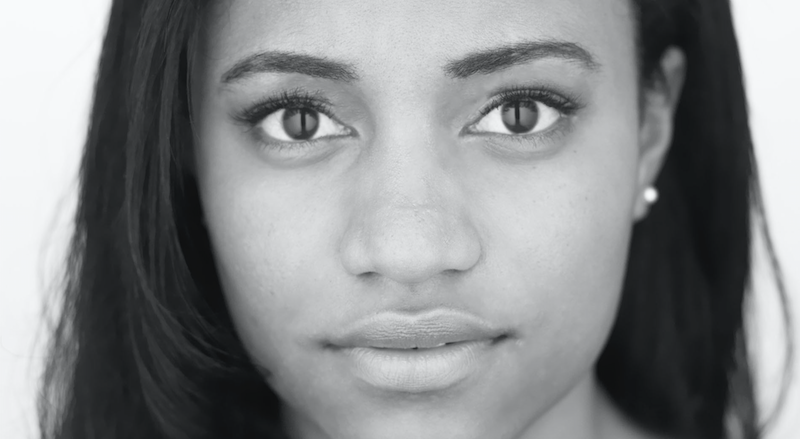INTERVIEW: In these difficult times, Ice Factory Festival needs ‘your listening’
Photo: Velani Dibba is one of the creators of the new virtual show ‘we need your listening.’ Photo courtesy of artist / Provided by DARR Publicity with permission.
The Ice Factory Festival, the annual theatrical celebration at the New Ohio Theatre in New York City, has moved their programming online this summer — for obvious reasons. Their first week of virtual performances focused on Beginning Days of True Jubilation, a piece created by Mona Mansour, and this weekend the festival turns its spotlight on we need your listening, by Velani Dibba and other collaborators.
The play, which is presented through Aug. 2, finds individual audience members entering “a dim space between digital and analog reality.” They are taken through a series of intimate, one-on-one exchanges with each performer, and the topic of each exchange is the power of listening.
The production comes to the Ice Factory Festival courtesy of shapeshifting, an interdisciplinary collective that combines theater, dance, music and film. Dibba is one of the chief creative forces behind the company, along with Ilana Khanin, Elizagrace Madrone and Stephen Charles Smith. According to her biography, Dibba is a Polynesian-West African director and multidisciplinary artist, focused on the collision of cultures through design-focused and ensemble-driven work.
Recently Hollywood Soapbox had the chance to exchange emails with Dibba about we need your listening. Questions and answers have been slightly edited for style.
What inspired you to help create this show?
There was an early conversation some of us had about the fact that many industries, besides the arts, have ways of dealing with the negative side effects of their occupations. For example, professional athletes have trainers who assess the regular damage to their muscles. Some jobs have hazard pay, others on-site psychologists. Although imperfect, there are established protocols for many jobs that assume a physical or psychological risk.
We were contending with the reality that actors are often asked to go through incredibly emotionally (and physically) taxing tolls and are often sent home without any support for the fallout. There’s this sense of, ‘I’m sure you know what you need to do to get there emotionally, so I’ll leave you to it.’ They are asked to embody the ideas of the artistic collective by delving into their vulnerable selves and are incredibly generous with their selves and their emotions, and yet audiences rarely get to know their own independent thoughts.
So I was really interested when Stephen first proposed creating intimate spaces that allowed actors to talk about the things they wanted to talk about. The four of us became interested in what types of listening created space for sharing and what things people wanted to share when they were given the chance. The deep, the banal, the vulnerable and the distracting.
Have there been challenges to craft a piece of theater for a virtual audience?
There definitely has been a fair amount of technical problem-solving, but it’s also exciting to dive into a newer medium and learn first-hand how to use it. I think where you get stuck is when you try to drag the conventions of another form into this new one, but we’ve had a lot of fun exploring the ways in which it’s both very different and very familiar to in-person theater.
How did rehearsals run with the cast members?
At first, we met individually with the actors over Zoom to get a sense of what their respective content might feel like. From there, we had several rehearsals where cast members got to act as audience members for each other, and those rehearsals were super revelatory about the nature of virtual listening. About half of our rehearsals are content rehearsals with the cast, and the other half are logistical rehearsals where the four of us are working to create a form that best features the content being developed with the cast.
What do you hope are the important lessons or takeaways that the virtual audience leaves the production with?
The premise of this show is built on our shared belief that people are inherently interesting when listened to in the right way. I hope audience members will leave this experience having been given the chance to explore what listening is and can be, and why it’s a radical act itself.
Do you feel that live theater has been changed forever because of the COVID-19 pandemic?
I feel that our understanding of theater has been irreversibly affected, but I’m grateful to be making theater at a time when we get to truly think about why the form looks this way. I think the pandemic has forced us to question, ‘Do we do this because it’s the best way to tell this story, or because we always have done it this way?’ There are some conventions that we’re no longer taking for granted, and it’s been delightful to discover those. There are other conventions that I cherish and miss now more than ever, conventions that fulfill needs I realize theater is uniquely situated to address. I think this is a pivotal period in theater history where we’re distilling what parts of the form are truly important, and which are habit.
By John Soltes / Publisher / John@HollywoodSoapbox.com
The Ice Factory Festival continues with we need your listening, presented as a live-stream through Aug. 2. Click here for more information.

